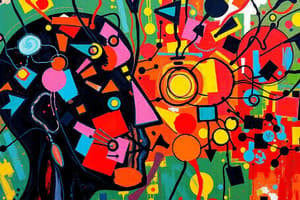Podcast
Questions and Answers
What type of antidepressants are commonly used for treating OCD?
What type of antidepressants are commonly used for treating OCD?
Which of the following is a 2nd generation antipsychotic used in treating OCD?
Which of the following is a 2nd generation antipsychotic used in treating OCD?
What is the main focus of response prevention in behavioral therapy for OCD?
What is the main focus of response prevention in behavioral therapy for OCD?
What role do nurses play in assisting OCD patients with exposure therapy?
What role do nurses play in assisting OCD patients with exposure therapy?
Signup and view all the answers
Why might it be difficult for nurses to understand OCD patients' behaviors?
Why might it be difficult for nurses to understand OCD patients' behaviors?
Signup and view all the answers
What do family and friends of individuals with OCD often mistakenly believe?
What do family and friends of individuals with OCD often mistakenly believe?
Signup and view all the answers
What should nurses do to support OCD patients during treatment?
What should nurses do to support OCD patients during treatment?
Signup and view all the answers
How can nurses help OCD patients maintain a structured routine?
How can nurses help OCD patients maintain a structured routine?
Signup and view all the answers
Study Notes
Obsessive-Compulsive Disorders Overview
- Patterns of obsessive thoughts and compulsive behaviors interrupt daily functioning and cause significant distress.
- Common obsessive actions include compulsive counting, organization, and checking behaviors.
Body-Focused Repetitive Disorders
- Characterized by body-focused repetitive behaviors, often a self-soothing response to stress rather than driven by obsession.
- Patients recognize the negative impact on social life yet struggle to cease the behavior.
Specific Disorders
- Dermatillomania: Also known as excoriation disorder; involves recurrent skin-picking leading to lesions and potential health issues.
- Trichotillomania: Involves pulling out one’s hair, which can be automatic or more conscious, often triggered by anxiety.
- Trichophagia: The urge to eat hair.
- Dermatophagia: The urge to eat one’s skin, including biting lips or cheeks.
- Onychotillomania: Nail picking.
- Onychophagia: Chronic nail-biting.
- Oniomania: Compulsive buying that exceeds financial means, often resulting in unused purchases; predominantly affects females.
- Kleptomania: Compulsive stealing for the thrill, not for the item's value, more common in females.
Treatment Options
- Long-term behavior therapy recommended for managing various compulsive behaviors.
- Medications like SSRIs and cognitive-behavioral therapy are effective, particularly for hoarding and OCD.
Body Dysmorphic Disorder (BDD)
- Preoccupation with perceived physical defects that others may not notice.
- Leads to excessive grooming, mirror checking, and can cause social isolation, depression, and suicidal thoughts.
Hoarding Disorder
- Difficulty in discarding possessions, leading to clutter that disrupts the use of living areas.
Definitions of Obsessions and Compulsions
- Obsessions: Intrusive and unwanted thoughts causing distress, interfering with daily functions.
- Compulsions: Ritualistic actions aimed at reducing anxiety associated with obsessions.
Manifestations of OCD
- Behaviors often include checking, counting, washing, praying, touching, and ordering.
- Typically presents in childhood for males and in the 20s for females, often with a family history of OCD.
Etiology of OCD
- Cognitive model posits that individuals may believe their thoughts are overly significant, necessitating control over them.
- Common themes include perfectionism, a heightened sense of personal responsibility, and an inflated perception of threat due to thoughts.
Studying That Suits You
Use AI to generate personalized quizzes and flashcards to suit your learning preferences.
Description
Explore lecture notes by Prof. Cherry Ann Durante on Obsessive-Compulsive Disorders. Learn about body-focused repetitive disorders and behaviors associated with OCD. Understand common symptoms like counting steps, organizing by color, and repetitive checking behaviors.




